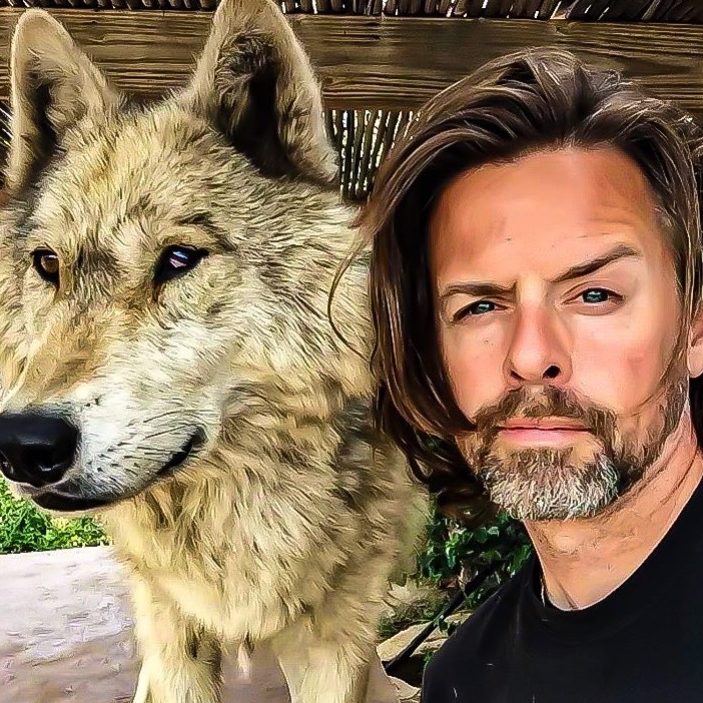There are some stark differences between living in Southern California in 2021 versus growing up in a small town near Greenville, South Carolina in the 70’s. Beit T’Shuvah resident Randall “Wolf” S.’s parents were pretty tolerant and open-minded, which at that time made them outliers. Racism and evangelicalism existed in spades.
It wasn’t an easy place to grow up. At best, Randall was expected to perform at the highest levels in his classes—and he did. At worst, his father was negligent and his mother sexually abusive. His mother suffered from severe bi-polar disorder and passed that on to Randall. After forcing him to join a religious cult for seven years, his mother was diagnosed with cancer when he was 22 and died a year later. Unfortunately, she didn’t only pass mental illness down, Randall also received a cancer diagnosis in his 30’s, only he survived.
It’s no surprise that shortly after his mother’s death, Randall turned to alcohol. He also jumped into a relationship with his mother’s best friend, 15 years his senior, which lasted three years.
Now, 50 years old and having never taken a break from drugs and alcohol since his early 20’s, Randall is trying on sobriety for the first time in his life, and he wears it well. Over the past 30 years, Randall has had many jobs as well as a career as an actor/writer/producer in Atlanta and eventually here in LA. One job that really resonated with him was when he took care of Coda, Maya, and Willow. He wasn’t a nanny though, and these aren’t the names of children. Coda, Maya, and Willow are wolves and Randall has never been closer to anyone or anything in his life since they accepted him into their pack.
He really related to them and has always believed in a pack mentality. His name Randall, or Randolf in German, means wolf shield He even went by the name Wolf for many years. And while the wolf still exists inside him, Randall, who prefers to go by his birth name now for the first time in a long time, is realizing that the wolf is the darker, injured part of him. While it protected him for many years and at the same time got him into trouble from time to time, he recognizes that it is now time to tame that beast and it starts by recognizing his own name.
All of these revelations he’s had in just the few short months he’s been a resident at Beit T’Shuvah. He is shocked at the compassion, empathy, and honesty that he’s experienced from both the staff and the other residents and truly believes that BTS is a template for recovery and that everyone could benefit from the lessons taught in these walls. “If this place didn’t exist, thousands of people would be dead that are alive, and I’m one of those people,” he says.
But Randall isn’t the type to just provide lip service, he’s about taking action which is why he’s currently training with the BTS running team, that this year is appropriately called The Social Distance. In addition, he plans to run the LA Marathon and to raise enough money by getting pledges and running it in under 3 hours so that he can start his own nonprofit called Wolf Pack Project.
Wolf Pack Project would not only help raise awareness and aid in passing legislation about the over-hunting and extinction of wolves, but will also work to help sexually abused children, the homeless, mentally ill, and anyone one else that needs help and doesn’t have a voice. He says, “A lot of these people don’t have a voice, they have hashtags. Wolves don’t speak, wolves don’t say words, they only recognize action. If you act they respect it. Words are just noise, irritating noise, and I don’t want to just say words… I want to act.”
Randall, who still writes, has many, many pages still left in the book of his life. He’s very thankful to Beit T’Shuvah, which for him is a gift. “It’s not just the food, therapy, and housing. BTS taught me how to do step 12 right. It’s taught me how to believe in myself like I’ve never believed in myself,” he explains. And he didn’t do it alone. His friends, family, and his newfound family at Beit T’Shuvah are all part of his pack, and his pack has saved him.
If you were moved by the story above, please consider making a donation to Beit T’Shuvah today to help ensure the life-saving work we do continues. Every dollar makes a difference. You can make a donation by going to https://beittshuvah.org/support/donate/ or emailing our development department at development@beittshuvah.org
